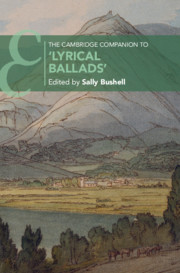Book contents
- The Cambridge Companion to ‘Lyrical Ballads’
- The Cambridge Companion to ‘Lyrical Ballads’
- Copyright page
- Dedication
- Contents
- Contributors
- Acknowledgements
- Chronology
- Abbreviations
- Introduction
- Part I Part and Whole
- Part II Subjects and Situations from Common Life
- Part III Feeling and Thought
- Part IV Language and the Human Mind
- Chapter 10 A ‘Radical Difference’
- Chapter 11 Awkward Relations: Poetry and Philosophy in Lyrical Ballads
- Part V A Global Lyrical Ballads
- Guide to Further Reading
- Index
Chapter 10 - A ‘Radical Difference’
Wordsworth’s Experiments in Language and Metre
from Part IV - Language and the Human Mind
Published online by Cambridge University Press: 08 February 2020
- The Cambridge Companion to ‘Lyrical Ballads’
- The Cambridge Companion to ‘Lyrical Ballads’
- Copyright page
- Dedication
- Contents
- Contributors
- Acknowledgements
- Chronology
- Abbreviations
- Introduction
- Part I Part and Whole
- Part II Subjects and Situations from Common Life
- Part III Feeling and Thought
- Part IV Language and the Human Mind
- Chapter 10 A ‘Radical Difference’
- Chapter 11 Awkward Relations: Poetry and Philosophy in Lyrical Ballads
- Part V A Global Lyrical Ballads
- Guide to Further Reading
- Index
Summary
The ‘Advertisement’ to the 1798 Lyrical Ballads anticipates a common theme in early responses to the volume: the poems are extraordinarily challenging. Reviewers were quick to agree that the poems frequently – and for some too frequently – required them ‘to struggle with feelings of strangeness and aukwardness’ and especially that they ‘sometimes [descend] too low’ stylistically, employing language that is ‘too familiar, and not of sufficient dignity’ (LB 3). One reviewer for the New London Review, reacting to Wordsworth’s statement that a ‘majority of the poems’ are to be considered ‘experiments’ intended to ‘ascertain how far the language of conversation in the middle and lower classes of society is adapted to the purposes of poetic pleasure’ (LB 3), bluntly declares that such language ‘can never be considered as the language of poetry’.1 As discourse intended to ‘affect the imagination’, the commentator argues, poetic language must ‘at least address itself to the imagination’, which has its own ‘peculiar style’ (33). Quoting Wordsworth’s advice to readers not to ‘suffer the solitary word Poetry, a word of very disputed meaning, to stand in the way of their gratification’, but instead to be pleased ‘in spite of that most dreadful enemy to our pleasures, our own pre-established codes of decision’, the reviewer comments: ‘Nothing can be more ludicrous than this ingenious request of our author’ (33). The experiments of Lyrical Ballads stem from an ‘indecision of taste’ traceable to the lamentable influence of Percy’s Reliques on ‘a numerous and meager race of stanza-enditers’ who ‘seem to have thought, that rudeness was synonimous [sic] to simplicity’ (33).
- Type
- Chapter
- Information
- The Cambridge Companion to 'Lyrical Ballads' , pp. 173 - 190Publisher: Cambridge University PressPrint publication year: 2020

